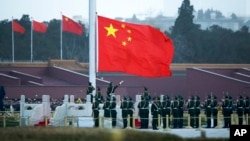China's national anthem, "March of the Volunteers," seemingly offered clear instructions to Shanghai residents frustrated with the government's oppressive COVID-containment lockdown: "Rise up, people who don't want to be slaves."
But when the inhabitants of the Chinese Communist Party's birthplace began posting that stirring first line on Weibo, China's version of Twitter, censors blocked it, along with another commanding line: "Arise! Arise! Arise!"
The national anthem is among the most potent identifiers of a country's tradition, history and beliefs. In its early years, China's anthem, the theme song of the popular 1935 film "Sons and Daughters in a Time of Storm," urged resistance to the invading Japanese.
But despite the composition's patriotic origins, China's censors have squelched the first line and its other passionate parts throughout the COVID-19 pandemic.
Censors tackled the national anthem soon after COVID-19 was first identified in humans in December 2019 in Wuhan. The official silencing of Dr. Li Wenliang, who issued warnings about the contagious new virus that killed him, sparked anger among netizens who posted the same lyrics on Douban, China's version of Reddit, according to the Language Log website.
Then, Chinese authorities blocked the anthem's first line because it contained "radical current politics or ideology," according to Twitter posts.
'Magic City' lockdown
Authorities locked down Shanghai on March 28, isolating 25 million people in China's economic center.
The anthem's first line began trending on social media last weekend until censors leapt onto Weibo, killing posts and related search results.
Since the initial round of lockdown easing last week, authorities have allowed 12 million people to go outdoors, according to The Associated Press, even as food shortages continue to plague Mo Du, or "Magic City," as Shanghai is known.
"Most internet censorship in China is outsourced directly to the social media companies who then face steep fines or punishment if they don't censor enough content," said Angeli Datt, senior research analyst for China, Hong Kong and Taiwan at Freedom House.
"It's not surprising in this heightened environment that companies are so overzealous in censoring perceived 'harmful' content that they've blocked access to the first line of China's national anthem. This is what happens when the CCP creates vague, undefined political red lines and an immense fear of punishment for crossing these red lines."
Weibo did not say why the content disappeared.
Many citizens responded by playing the national anthem from their balconies and windows.
Observers and journalists quickly took to Twitter to comment.
"Patriotism in China is a tricky balance," tweeted Bloomberg tech columnist Tim Culpan.
"So when will the whole national anthem be censored?" asked Henry Gao, a law professor at Singapore Management University.
"To be honest, I'm surprised this hasn't happened sooner," said Xifan Yang, a China correspondent for Die Zeit.
"Lyrics of China's national anthem are the new sensitive words on China's social media," Chu Yang, a European freelance journalist, tweeted. "Ironic on so many levels."
"Revolutions always eat their creators," posted American economist Chris Balding.
American critic and author Bill Kristol posted, "I don't know nearly enough to judge if this is merely very unlikely or wildly unlikely, but it does seem to me the odds that China could be approaching a regime crisis aren't zero."
In keeping with the "slave" theme of the anthem's first line, Shanghai rapper Fang Lue, known as Astro, took to Weibo to release a video for his song "New Slave," whose lyrics criticize the government for abusing power and neglecting lives: "When freedom and will of thought are imprisoned by power/ When the green passage is blocked and becomes a forbidden road/ When one wearing a uniform only cares about his career/ When life and the dignity of life are regarded as manure."
"I wrote this song because I saw the passing of my life and my powerlessness, and I feel a deep sadness," Astro posted on his YouTube channel.
"I come from the love I have for it all. … I hope everyone can speak rationally."
After his song went viral, the rapper deleted it from his channel.
"As netizens in Shanghai and other parts of China push back and express themselves about the country's COVID-19 policies, authorities will be fearful of any expression that could build into organized dissent to the party," said Datt. "The Chinese Communist Party aim is the survival of the party."
VOA's Asim Kashgarian contributed to this report.





